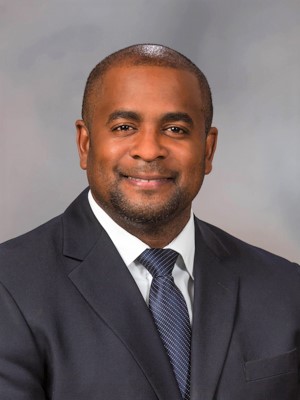
By Debbie Bunch
September 16, 2024
Driscoll DeVaul spent 20 years in the hospital setting before moving into academia.
As more and more educators in respiratory care reach retirement age, educational programs are increasingly looking to therapists in the clinical setting to step up and take on educator roles. How far can someone who starts out teaching in an RT program go with their career?
Driscoll DeVaul, DHA, RRT, is a great example. After 20 years in the hospital setting, he transitioned into academia and is now assistant dean of academic affairs in the School of Health Related Professions at the University of Mississippi Medical Center (UMMC) in Jackson. He shares his career journey with us in this interview —
When did you become interested in a career in respiratory care and what drew you to the profession?
My older brother had a history of asthma, and I became familiar with the career due to the care that was provided to him at UMMC. Ironically, I began my career at UMMC while in RT school as an equipment tech in the respiratory care department. Upon graduating from the Hinds Community College respiratory technology program, I was hired at UMMC as a staff RT, clinical coordinator, and ECMO specialist, and progressed to become the director of respiratory care.
How long did you work as a clinical RT before you moved into the educational setting, and what are some of the key lessons you learned from that experience?
During my 20 years as a clinical RT, I gained valuable insights into the facets of health care leadership and clinical operations, the importance of patient-centered care, and the challenges and opportunities involved in delivering the best possible patient care. I also learned the importance of strong team collaboration in providing optimal health care.
When did you move into education and what drove you to make that change?
I started my career as an adjunct professor, while still in the RT director role, after earning my doctoral degree in the fall of 2020. I transitioned to the field of education in August 2021, taking on the roles of assistant dean of academic affairs and assistant professor of health sciences in the University of Mississippi Medical Center’s School of Health Related Professions.
My motivation or drive to change came from my strong desire to educate, mentor, and prepare future health care professionals. This has always been my passion.
What did it take to get the job as assistant dean?
The position required experience in both clinical and administrative roles, as well as advanced academic qualifications (a doctoral degree).
What does the position entail and how does your RT background help you in the job?
The position involves overseeing academic affairs, curriculum and program development, and faculty and staff management. My RT background aids in understanding clinical education and enhancing program quality. Also, the great connections that I have built with so many stakeholders internally and externally have helped make my transition a smooth one.
What are the biggest challenges, and biggest rewards of working in your current position and why?
The biggest challenges are balancing administrative duties and teaching and addressing diverse student needs. The biggest rewards include influencing the future, helping programs thrive, creating new programs, supporting our dean and faculty and health care professionals, mentoring, and contributing to academic growth.
What are your top 3-4 bits of advice for other therapists who might like to follow in your footsteps and move into an upper leadership position such as the one you hold today?
- Gain diverse clinical and leadership experience and be a strong advocate for RT.
- Pursue advanced education and certifications.
- Develop strong communication and mentoring skills.
- Stay involved in professional organizations and committees and work to advance the RT department and the RT profession.








